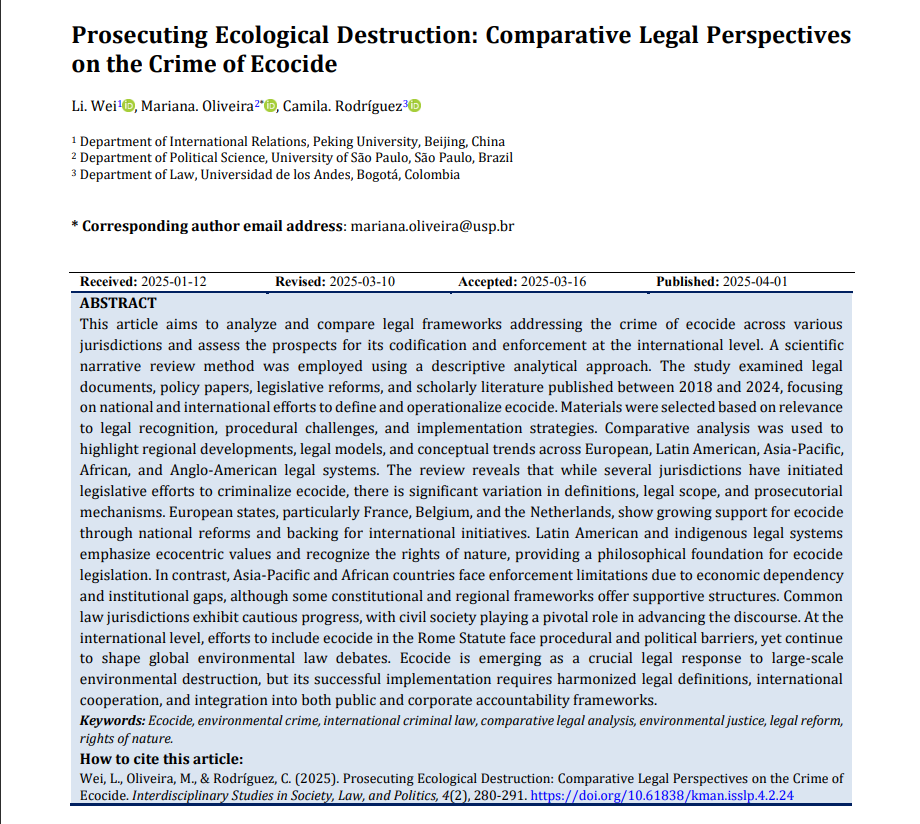Prosecuting Ecological Destruction: Comparative Legal Perspectives on the Crime of Ecocide
Keywords:
Ecocide, environmental crime, international criminal law, comparative legal analysis, environmental justice, legal reform, rights of natureAbstract
This article aims to analyze and compare legal frameworks addressing the crime of ecocide across various jurisdictions and assess the prospects for its codification and enforcement at the international level. A scientific narrative review method was employed using a descriptive analytical approach. The study examined legal documents, policy papers, legislative reforms, and scholarly literature published between 2018 and 2024, focusing on national and international efforts to define and operationalize ecocide. Materials were selected based on relevance to legal recognition, procedural challenges, and implementation strategies. Comparative analysis was used to highlight regional developments, legal models, and conceptual trends across European, Latin American, Asia-Pacific, African, and Anglo-American legal systems. The review reveals that while several jurisdictions have initiated legislative efforts to criminalize ecocide, there is significant variation in definitions, legal scope, and prosecutorial mechanisms. European states, particularly France, Belgium, and the Netherlands, show growing support for ecocide through national reforms and backing for international initiatives. Latin American and indigenous legal systems emphasize ecocentric values and recognize the rights of nature, providing a philosophical foundation for ecocide legislation. In contrast, Asia-Pacific and African countries face enforcement limitations due to economic dependency and institutional gaps, although some constitutional and regional frameworks offer supportive structures. Common law jurisdictions exhibit cautious progress, with civil society playing a pivotal role in advancing the discourse. At the international level, efforts to include ecocide in the Rome Statute face procedural and political barriers, yet continue to shape global environmental law debates. Ecocide is emerging as a crucial legal response to large-scale environmental destruction, but its successful implementation requires harmonized legal definitions, international cooperation, and integration into both public and corporate accountability frameworks.
Downloads
References
Adigun, M. (2024). Ecocide: The ‘Forgotten’ Legacy of Nuremberg. Zeitschrift Für Ausländisches Öffentliches Recht Und Völkerrecht / Heidelberg Journal of International Law, 84(1), 44-77. https://doi.org/10.17104/0044-2348-2024-1-44
Aida, M., Tahar, A. M., & Davey, O. M. (2023). Ecocide in the International Law: Integration Between Environmental Rights and International Crime and Its Implementation in Indonesia. 572-584. https://doi.org/10.2991/978-2-38476-046-6_57
Arifin, R., Masyhar, A., Wulandari, C., Kusuma, B., Wijayanto, I., Rasdi, R., & Fikri, S. (2024). Ecocide as the Serious Crime: A Discourse on Global Environmental Protection. Iop Conference Series Earth and Environmental Science, 1355(1), 012004. https://doi.org/10.1088/1755-1315/1355/1/012004
Babakhani, E. (2023). On the Effectiveness of Restorative Justice in the Ecocide Crime. Vilnius University Open Series, 7-15. https://doi.org/10.15388/phdstudentsconference.2023.1
Bandopadhay, S. (2024). Peace and Sustainability From the Lens of Rights of Nature: Arguing the Case for Ecocide. E3s Web of Conferences, 585, 03006. https://doi.org/10.1051/e3sconf/202458503006
Borschevska, O. M. (2023). Public Legal and Private Legal Aspects of Defining the Definition of «ecocide» During Military Aggression. Constitutional State(49), 113-129. https://doi.org/10.18524/2411-2054.2023.49.276017
Brynzanska, O. (2023a). Criminal Liability for Ecocide Under International Law. Scientific and Informational Bulletin of Ivano-Frankivsk University of Law Named After King Danylo Halytskyi(16(28)), 48-56. https://doi.org/10.33098/2078-6670.2023.16.28.48-56
Brynzanska, O. (2023b). Distinction Between Ecocide (Art. 441 of the Criminal Code of Ukraine) and Violations of the Laws and Customs of War as Damage to the Natural Environment (Art. 438 of the Criminal Code of Ukraine). Economics Finances Law, 7(-), 82-86. https://doi.org/10.37634/efp.2023.7.17
Brynzanska, O. (2024). Ecocide Under the Criminal Code of Ukraine and Criminal Legislations of Foreign Countries. Alʹmanah Prava(15), 215-220. https://doi.org/10.33663/2524-017x-2024-15-215-220
Goettsche-Wanli, G., & Müller, J.-A. (2024). Does ‘Ecocide’ Provide a Viable Option to Address the Gravest Crimes Against the Marine Environment? The International Journal of Marine and Coastal Law, 1-47. https://doi.org/10.1163/15718085-bja10216
Haltsova, V. V., Volodina, O. O., Hordieiev, V. I., Samoshchenko, I., & Orobets, K. (2024). Analysis of Criminal Law on Ecocide: A Case Study of War in Ukraine. Revista Kawsaypacha Sociedad Y Medio Ambiente(14), D-013. https://doi.org/10.18800/kawsaypacha.202402.d013
Joubert, S. (2023). Can Crimes of Ecocide Committed During the Conflict in Ukraine Be Legally Punished? Law and World, 9(4), 91-100. https://doi.org/10.36475/9.4.7
Killean, R., & Newton, E. (2024). From Ecocide to Ecocentrism: Conceptualising Environmental Victimhood at the International Criminal Court. International Review of Victimology, 31(2), 238-264. https://doi.org/10.1177/02697580241269426
Kovalenko, V., Komarynska, Y., Klymchuk, M., Pavluk, O., & Korshykova, T. (2024). International and National Mechanisms Combating Ecosystems’ Damage and Environmental Crimes to Foster Sustainable Development. Grassroots Journal of Natural Resources, 7(2), 63-82. https://doi.org/10.33002/nr2581.6853.070203
Kozak, I. (2024). Crime of Ecocide in Ukraine – Environmental Consequences of Russian Military Aggression. Studia Prawnicze KUL(4), 101-116. https://doi.org/10.31743/sp.16745
Medvedieva, M., & Bilotskiy, S. D. (2023). Armed Conflict, Ecocide and Climate Change at a Crossroad: Some Legal Perspectives. Actual Problems of International Relations(155), 47-57. https://doi.org/10.17721/apmv.2023.155.1.47-57
Minkova, L. G. (2024). Ecocide, Sustainable Development and Critical Environmental Law Insights. Journal of International Criminal Justice, 22(1), 81-97. https://doi.org/10.1093/jicj/mqae006
Nowak, E. (2022). From Genocide to Ecocide. Essentials of a New Category of International Crime Against Humanity. Undecidabilities and Law(2), 75-98. https://doi.org/10.14195/2184-9781_2_4
Prihandono, I., & Yuniarti, D. (2022). Expanding the Jurisdiction of the International Criminal Court. Brawijaya Law Journal, 9(2), 182-195. https://doi.org/10.21776/ub.blj.2022.009.02.05
Robinson, D. (2022). Ecocide — Puzzles and Possibilities. Journal of International Criminal Justice, 20(2), 313-347. https://doi.org/10.1093/jicj/mqac021
Stock, C. (2023). A Fifth Core Crime: Crime of Ecocide as a New Puzzle of the International Criminal Law. Yearbook of International & European Criminal and Procedural Law, 1(1), 248-284. https://doi.org/10.12681/yiecpl.33001
Tulibayev, S. T. (2023). Ecocide in International Law: Draft Definition for the Rome Statute. Bulletin of L N Gumilyov Eurasian National University Law Series, 143(2), 191-198. https://doi.org/10.32523/2616-6844-2023-143-2-191-198
Tulibayev, S. T. (2024). The Issue of Recognition of Ecocide as a Crime by Environmental Courts and Tribunals. Bulletin of the Karaganda University “Law Series”, 11329(1), 87-93. https://doi.org/10.31489/2024l1/87-93
Wasiuta, S. (2023). Problemy Uznania Ekobójstwa Jako Zbrodni. 542-568. https://doi.org/10.24917/9788380849396.29
Вереша, Р. В., Кучинська, О. П., & Kovtun, O. (2023). Ecocide in National and International Criminal Law: Current Challenges and Prospects for Legal Regulation. Uzhhorod National University Herald Series Law, 2(78), 152-159. https://doi.org/10.24144/2307-3322.2023.78.2.24

Downloads
Additional Files
Published
Submitted
Revised
Accepted
Issue
Section
License

This work is licensed under a Creative Commons Attribution-NonCommercial 4.0 International License.





